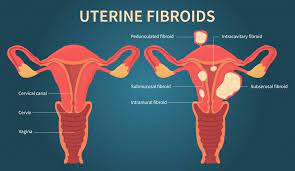Fibroid Treatment FAQs
Do You Have a Question About Fibroids?
If you’ve been diagnosed with uterine fibroids, you probably have lots of questions. Luckily, Premier Vein and Vascular Center is here to ensure you know exactly what to expect in terms of treatment. Our Houston, TX fibroid treatment clinic aims to put all your concerns to rest with reliable medical advice and compassionate providers. Below, we’ve compiled some of our most frequently asked questions for your convenience. Don’t see your question listed here? Feel free to contact us.

What Are Uterine Fibroids?
Uterine fibroids are growths that occur on the wall of the uterus. These growths are made of muscle and tissue and can reach up to 8 inches in diameter, though they are usually much smaller.
What Causes Uterine Fibroids?
We aren’t yet sure what causes fibroids. Fortunately, this common condition has numerous options for treatment.
What Do Fibroids Look Like?
Fibroids are usually round and smooth. Sometimes, they might have a stem, making them appear sort of like a mushroom.
Where Do Fibroids Grow?
Fibroids can grow inside and outside the uterus, as well as on the uterine wall.
How Are Uterine Fibroids Diagnosed?
Most of the time, fibroids are diagnosed during a pelvic exam or annual checkup. To confirm the diagnosis, patients can undergo ultrasound CT scans or MRI.
Are Fibroids Cancerous?
Typically, no. Most cases of fibroids are benign, and the chances are slim that one will become a malignant tumor. Nevertheless, if you develop fibroids after menopause or your fibroids are growing rapidly, it’s in your best interests to schedule an examination with your OB/Gyn.
What Are Symptoms of Fibroids?
In many cases, fibroids don’t cause any noticeable symptoms. However, it’s still important to be aware of the warning signs. Large fibroids might result in these symptoms:
- Painful menstruation
- Excessive menstrual bleeding
- Frequent urination
- Lower back pain
- Constipation
- Fullness in the lower abdomen
- Bleeding between periods
How Painful Are Fibroids?
Small fibroids usually aren’t painful at all. In fact, many patients aren’t aware they have them. But larger fibroids can cause severe menstrual cramps, sharp pain in the abdomen, and discomfort during sex.
Are Fibroids Common?
Fibroids are very common among women. Studies have suggested that anywhere from 40 to 80% of women have fibroids, but many do not show symptoms.
Am I at Risk for Uterine Fibroids?
Although fibroids are very common, a few factors may increase your chance of developing these growths. Obesity, genetics, menstruating at a young age, and not having children are commonly identified as risk factors.
Do Fibroids Change Over Time?
Over time, fibroids might get bigger or smaller. This can happen because of fluctuations in hormone levels, commonly after menopause or during pregnancy.
Can Fibroids Cause Anemia?
Because fibroids can cause heavy periods, and heavy periods can lead to anemia, fibroids and anemia are linked. Fortunately, iron pills and other treatments can significantly reduce symptoms of anemia.
What Are Some Fibroid Treatments?
Uterine fibroid treatments vary based on your specific circumstances. Your provider at Premier Vein & Vascular Center will first learn a little about your situation—how many fibroids you have, the size of the growths, and whether you’re planning to become pregnant. Once we have those details, our team recommend one of the following fibroid treatments without surgery:
- Over-the-counter pain medications (ex. acetaminophen, ibuprofen)
- Birth control
- Iron supplements
- Oral therapy (ex. Elagolix)
- Gonadotropin-releasing hormone agonists
When Should Fibroids Be Surgically Removed?
Sometimes, surgery is the best method for addressing fibroid symptoms. We’ll evaluate the size, location, and number of fibroids before recommending a procedure.
Can Fibroids Affect Pregnancy?
Usually, small fibroids don’t have much of an impact on pregnancy. Nevertheless, larger growths can increase the risk of certain complications. Patients with fibroids are more likely to experience a C-section, breech presentation, or pre-term delivery. No matter the extent of your fibroids, it’s always a good idea to check with your medical provider should you become pregnant.
